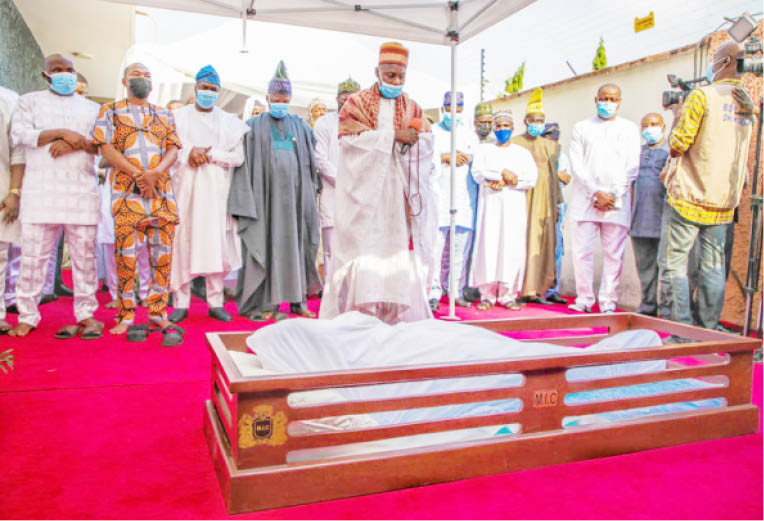Nigeria lost another of its illustrious sons, Alhaji Lateef Kayode Jakande, a former Governor of Lagos State, on Thursday, February 11, 2021.
In Jakande, Nigeria and Nigerians have lost a statesman, humanist, professional journalist and progressive politician.
- Residents Killed As Gunmen Carry Out Fresh Attacks In Niger
- Students, Staff Abducted As Gunmen Break Into Niger School
It is, therefore, less surprising that Nigerians across all divides came out to mourn his death.
In his condolence message, President Muhammadu Buhari said Jakande lived for the good of others, state and country. In a statement issued by his spokesman, Femi Adesina, President Buhari said Jakande’s legacy of standing for all that was right for humanity would be long remembered. While condoling with family, friends and associates of the late elder statesman, Buhari said his imprint on the commercial nerve centre of the country, Lagos State, would continue to awe and inspire the nation, reminding everyone of the strength of character and sacrifices of the visionary leader.
By all measures, the late Jakande deserves all the accolades by Nigerians because he distinguished himself both as a journalist and as a politician. As a journalist, the late elder statesman saw to the rising profile of the profession at the Nigerian Tribune, where he was the editor-in-chief; the Nigeria Institute of Journalism (NIJ), as one of its founding fathers and the Newspaper Proprietors Association of Nigeria (NPAN), as its president at a time.
As a politician, Jakande was seen as an organiser and principled. He led other governors who won elections under the Unity Party of Nigeria (UPN), Great Nigeria Peoples Party (GNPP) and Peoples Redemption Party (PRP) to present a formidable opposition to the ruling party, the National Party of Nigeria (NPN).
With all these, however, Jakande would be best remembered as Governor of Lagos State between 1979 and 1983. In those four years he turned around the state through his massive infrastructure programme where he built hundreds of schools, health centres and houses. He also came up with the ambitious programme to build a metro rail line to address the intra-city transportation problem of the state; the traffic gridlock. Unfortunately, the project was stopped by the military regime which took over power. However, he was credited with the expansion of water transport which eased commuting within the city.
Through these projects, Jakande changed the fortunes of many ordinary Nigerians in the state who were able to attend schools under his education programme and acquire houses under the mass housing programme. This earned him the titles of “The man who saw the future” and “Baba Kekere” and people touted him to be the heir apparent to the party’s leader, Chief Obafemi Awolowo.
Even as Minister of Works and Housing, Jakande ensured the launching of a housing programme to enable ordinary Nigerians to own houses. Two of such projects are located in Lugbe and Kado, both in the Federal Capital Territory (FCT).
Indeed, Jakande has left a legacy that would be difficult to match by other politicians. He demonstrated that politics and political power are meant to be used in the service of humanity. Above all, he demonstrated sense of humility and prudence throughout his sojourn on earth.
As governor, he was prudent in the use of state resources and never allowed his immediate family to profit from that. In retirement, he allowed those who came after him to operate freely without interference from him. Thus he earned himself a well-deserved respect from politicians and his professional colleagues in the media. Adieu Baba Kekere. May Allah (SWT) grant him Aljannah Firdausi.

 Join Daily Trust WhatsApp Community For Quick Access To News and Happenings Around You.
Join Daily Trust WhatsApp Community For Quick Access To News and Happenings Around You.


